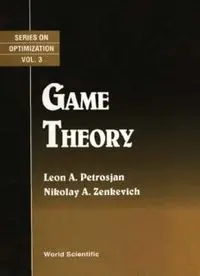Table Of ContentGAME
THEORY
SERIES ON OPTIMIZATION
Published
Vol. 2 Differential Games of Pursuit
by L A. Petrosjan
Vol. 3 Game Theory
by L A. Petrosjan and N. A. Zenkevich
SERIES ON
OPT!IV]IZATiON
VO L . 3
GAME
THEORY
Leon A. Petrosjan
Nibolay A. Zenkevich
Faculty of Applied Mathematics
St. Petersburg State University
RUSSIA
j World Scientific
Singapore* New Jersey •London •Hong Kong
Published by
World Scientific Publishing Co. Pte. Ltd.
P O Box 128, Fairer Road, Singapore 912805
USA office: Suite IB, 1060 Main Street, River Edge, NJ 07661
UK office: 57 Shelton Street, Covent Garden, London WC2H 9HE
library of Congress Cataloging-in-Publication Data
Petrosjan, L. A. (Leon Aganesovich)
Game theory / Leon A. Petrosjan, Nikolay A. Zenkevich.
xi, 352 p.; 22.5 cm -- (Series on optimization ; vol. 3)
ISBN 981022396X
1. Game theory. I. Zenkevich, N. A. (Nikolai Anatol'evich)
II. Tide. III. Series.
QA269.P47 1996
519.3-dc20 95-3547
cn>
English translation by J. M. Donetz.
British Library Cataloguing-in-Publication Data
A catalogue record for this book is available from the British Library.
Copyright © 1996 by World Scientific Publishing Co. Pte. Ltd.
All rights reserved. This book, or parts thereof, may not be reproduced in any form or by any means,
electronic or mechanical, including photocopying, recording or any information storage and retrieval
system now known or to be invented, without written permission from the Publisher.
For photocopying of material in this volume, please pay a copying fee through the Copyright
Clearance Center, Inc., 222 Rosewood Drive, Danvers, Massachusetts 01923, USA.
This book is printed on acid-free paper.
Printed in Singapore by Uto-Print
Acknowledgments
We begin by acknowledging our debts to our teacher Nicolay Vorobjev who started
in the former Soviet Union teaching us game theory, the time when this subject was
not a necessary part of applied mathematics, economics and management science
curriculum.
We have to mention specially Elena A. Semina who wrote with us sections 1.7,
1.9, 3.7, 3.13, 4.4-4.6, 4.8, 4.9 and sections 5.2-5.6, 5.8 for the Russian version of the
book and Jury M. Donetz who translated the book in English.
We thank Olga Kholodkevich, Maria Kultina, Tatiana Survillo and Sergey Voz-
nyuk for their effective research assistance; and also for reading the manuscript and
suggesting ways to improve it.
Many thanks to Andrey Ovsienko and Sergey Voznyuk for preparation of the
manuscript in M g X .
v
This page is intentionally left blank
Preface
Game theory is a branch of modern applied mathematics that aims to analyze various
problems of conflict between parties that have opposed, similar or simply different
interests. A theory of games, introduced in 1921 by Emile Borel, was established
in 1928 by John von Neumann and Oskar Morgenstern, to develop it as a means
of decision making in complicated economic systems. In their book "The Theory of
Games and Economic Behaviour", published in 1944, they asserted that the classical
mathematics developed for applications in mechanics and physics fail to describe the
real processes in economics and social life. They have also seen many common factors
such as conflicting interests, various preferences of decision makers, the dependence
of the outcome for each individual from the decisions made by other individuals both
in actual games and economic situations. Therefore, they named this new kind of
mathematics game theory.
Games are grouped into several classes according to some important features. In
our book we consider zero-sum two-person games, strategic n-person games in normal
form, cooperative games, games in extensive form with complete and incomplete
information, differential pursuit games and differential cooperative n-person games.
There is no single game theory which could address such a wide range of "games".
At the same time there are common optimality principles applicable to all classes
of games under consideration, but the methods of effective computation of solutions
are very different. It is also impossible to cover in one book all known optimality
principles and solution concepts. For instance only the set of different "refinements"
of Nash equilibria generates more than 15 new optimality principles. In this book we
try to explain the principles which from our point of view are basic in game theory,
and bring the reader to the ability to solve problems in this field of mathematics. We
have included results published before in Petrosjan (1965), (1968), (1970), (1972),
(1977), (1992), (1993); Petrosjan and Zenkevich (1986); Zenkevich and Marchenko
(1987), (1990); Zenkevich and Voznyuk (1994).
vii
This page is intentionally left blank
Contents
1 Matrix games 1
1.1 Definition of a two-person zero-sum game in normal form 1
1.2 Maximin and minimax strategies 5
1.3 Sadle points 7
1.4 Mixed extension of a game 1
1.5 Convex sets and systems of linear inequalities 15
1.6 Existence of a solution of the matrix game in mixed strategies . . . . 18
1.7 Properties of optimal strategies and value of the game 2
1.8 Dominance of strategies 30
1.9 Completely mixed and symetric games 35
1.10 Iterative methods of solving matrix games 40
1.1 Exercises and problems 4
2 Infinite zero-sum two-person games 49
2.1 Infinite games 49
2.2 £-sadle points, c-optimal strategies 52
2.3 Mixed strategies 57
2.4 Games with continuous payof functions 64
2.5 Games with a convex payof function 70
2.6 Simultaneous games of pursuit 79
2.7 One clas of games with a discontinuous payof function 85
2.8 Solution of simultaneous infinite games of search 8
2.9 Games of secondary search 92
2.10 A poker model 104
2.1 Exercises and problems 121
3 Nonzero-sum games 125
3.1 Definition of noncoperative game in normal form 125
3.2 Optimality principles in noncoperative games 129
3.3 Mixed extension of noncoperative game 136
3.4 Existence of Nash equilibrium 139
3.5 Kakutani fixed-point theorem and proof of existence of an equilibrium
in n-person games 142
3.6 Refinements of Nash equilibria 145
ix

